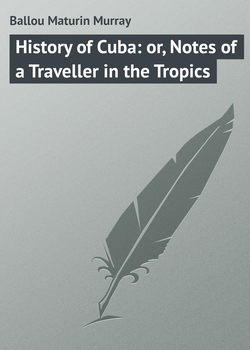History of Cuba: or, Notes of a Traveller in the Tropics

Реклама. ООО «ЛитРес», ИНН: 7719571260.
Оглавление
Ballou Maturin Murray. History of Cuba: or, Notes of a Traveller in the Tropics
PREFACE
CHAPTER I
CHAPTER II
CHAPTER III
CHAPTER IV
CHAPTER V
CHAPTER VI
CHAPTER VII
CHAPTER VIII
CHAPTER IX
CHAPTER X
CHAPTER XI
CHAPTER XII
CHAPTER XIII
CHAPTER XIV
CHAPTER XV
CHAPTER XVI
Отрывок из книги
The island of Cuba, one of the earliest discoveries of the great admiral, has been known to Europe since 1492, and has borne, successively, the names of Juana,1 Fernandina, Santiago and Ave Maria, having found refuge at last in the aboriginal appellation. Soon after its discovery by Columbus, it was colonized by Spaniards from St. Domingo, but was considered mainly in the light of a military depôt, by the home government, in its famous operations at that period in Mexico. The fact that it was destined to prove the richest jewel in the Castilian crown, and a mine of wealth to the Spanish treasury, was not dreamed of at this stage of its history. Even the enthusiastic followers of Cortez, who sought that fabulous El Dorado of the New World, had no golden promise to hold forth for this gem of the Caribbean Sea.
The Spanish colonists from St. Domingo found the island inhabited by a most peculiar native race, hospitable, inoffensive, timid, fond of the dance and the rude music of their own people, yet naturally indolent and lazy, from the character of the climate they inhabited. They had some definite idea of God and heaven; and were governed by patriarchs, or kings, whose word was law, and whose age gave them precedence. They had few weapons of offence or defence, and knew not the use of the bow and arrow. Of course, they were at once subjected by the new comers, who reduced them to a state of slavery; and, proving hard taskmasters, the poor, over-worked natives died in scores, until they had nearly disappeared, when the home government granted permission to import a cargo of negroes from the coast of Africa to labor upon the ground, and to seek for gold, which was thought to exist in the river-courses.2 Thus early commenced the slave-trade of Cuba, a subject to which we shall have occasion more fully to refer.
.....
We have seen that the office of captain-general was established in 1589, and, with a succession of incumbents, the office has been maintained until the present day, retaining the same functions and the same extraordinary powers. The object of the Spanish government is, and ever has been, to derive as much revenue as possible from the island; and the exactions imposed upon the inhabitants have increased in proportion as other colonies of Spain, in the western world, have revolted and obtained their independence. The imposition of heavier burthens than those imposed upon any other people in the world has been the reward of the proverbial loyalty of the Cubans; while the epithet of "ever-faithful," bestowed by the crown, has been their only recompense for their steady devotion to the throne. But for many years this lauded loyalty has existed only in appearance, while discontent has been fermenting deeply beneath the surface.
The Cubans owe all the blessings they enjoy to Providence alone (so to speak), while the evils which they suffer are directly referable to the oppression of the home government. Nothing short of a military despotism could maintain the connection of such an island with a mother country more than three thousand miles distant; and accordingly we find the captain-general of Cuba invested with unlimited power. He is, in fact, a viceroy appointed by the crown of Spain, and accountable only to the reigning sovereign for his administration of the colony. His rule is absolute; he has the power of life and death and liberty in his hands. He can, by his arbitrary will, send into exile any person whatever, be his name or rank what it may, whose residence in the island he considers prejudicial to the royal interest, even if he has committed no overt act. He can suspend the operation of the laws and ordinances, if he sees fit to do so; can destroy or confiscate property; and, in short, the island may be said to be perpetually in a state of siege.
.....